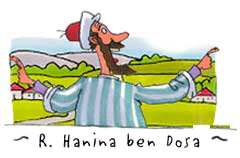R.
Hanina ben Dosa was carrying some salt when rain began to fall. He
said in prayer: "Everybody feels pleasant, but Hanina does not."
The rain halted. Entering his home, he said: "Everybody feels
unpleasant except Hanina." The rain came down once more.
People
came to R. Hanina and said: "Your goats are doing damage."
He replied: "If my goats are causing damage, may they be eaten
by wolves! If not, may each one bring in a wolf on his horns."
Each goat brought in a wolf.
Once a
man left some hens at R. Hanina's door. He set them on their eggs, and,
when he had too many chicks, he sold them and purchased goats. When, after
considerable time had passed, a man informed him that he had left some hens
with him by mistake, R. Hanina gave him the goats. These were the goats
who brought in the wolves.[7]
 On
one Sabbath eve at twilight [R. Hanina] saw his daughter sad. He said to
her: "Why are you sad?" She replied: "I exchanged my vinegar
can for my oil can, and I kindled the Sabbath light with vinegar (and it
will be extinguished)." He said to her: "My daughter, why should
this trouble you? He who commanded the oil to burn will also command the
vinegar to burn." The vinegar burned all day until after Havdalah (the
end of the Sabbath).[8]
On
one Sabbath eve at twilight [R. Hanina] saw his daughter sad. He said to
her: "Why are you sad?" She replied: "I exchanged my vinegar
can for my oil can, and I kindled the Sabbath light with vinegar (and it
will be extinguished)." He said to her: "My daughter, why should
this trouble you? He who commanded the oil to burn will also command the
vinegar to burn." The vinegar burned all day until after Havdalah (the
end of the Sabbath).[8]
***
Every
Friday the wife of R. Hanina ben Dosa would heat the oven by burning
smoke-producing fuel because she was ashamed [to have it known that
she had nothing to bake for the Sabbath]. But she had a malicious
neighbor who said, "I know that these people have nothing; let
me go and see what causes that smoke." She went and knocked at
the door. Embarrassed by the unexpected visit, the wife of R. Hanina
withdrew to an inner room. A miracle was wrought [for her], so that
the neighbor found the oven full of bread and the kneading trough
full of rising dough. Seeing that , she called out to her: "Madam,
madam, bring your shovel, for your bread is about to get charred."
R. Hanina's wife called back, "Yes, I just went to the other
room to fetch one."
Once Hanina's
wife said to him: How long are we to go on suffering so much: He replied:
"What shall we do?" She said, "Pray that some of what is
stored up for the righteous in the world-to-come be given you here and now."
He prayed, and [from above] there emerged the semblance of a hand which
gave him a leg of a golden table. That night in a dream he saw each of the
other righteous men [in the world-to-come] dining at a table with three
legs but he and his wife were dining at a table with only two legs. So he
said to his wife: Are you content to have all of the righteous dine at three-legged
tables, will you and I dine at a table with one of its legs missing?"
She said: "What shall we do? You have no choice but to pray that the
leg be taken away from you." He prayed and it was taken back. The sages
taught: The latter miracle was greater than the former; for we have a tradition
that Heaven gives but never takes back.[9]
|
[1]
Ex. 18:21 [back]
[2] TB Berarkhot 61b [back]
[3] TB
Berarkhot 34b; Yevamot 21b [back]
[4] TB Sotah 9:15 [back]
[5] TB Baba Batra 74b [back]
[6] TB Ta'anit 25a [back]
[7] TB Ta'anit 24 [back]
[8] TB Ta'anit 25a [back]
[9] TB Ta'anit 25a [back]
|
|
 H.N.
Bialik and Y.H. Ravnitzky, eds., Sefer Ha-Aggadah (The Book
of Legends), translated by William G. Braude, (Schocken Books, NY,
1992). H.N.
Bialik and Y.H. Ravnitzky, eds., Sefer Ha-Aggadah (The Book
of Legends), translated by William G. Braude, (Schocken Books, NY,
1992).
 Louis
Newman and Samuel Spitz, The Talmudic Anthology: Tales and Teachings
of the Rabbis (New York: Behrman House, 1995). Louis
Newman and Samuel Spitz, The Talmudic Anthology: Tales and Teachings
of the Rabbis (New York: Behrman House, 1995).
|